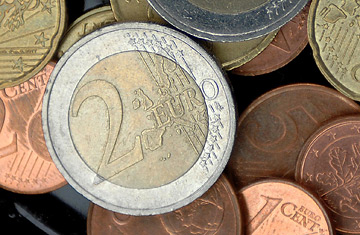
European officials have asked the public to vote on the design of a new two Euro coin.
Who says the European Union is undemocratic? This month, the E.U.'s 495 million citizens will have the chance to vote in a remarkable European election, and one that will hit their wallets by next year: choosing the design of the new two-euro coin.
Unlike the European Parliament elections, where candidates are restricted to national territories, this vote covers all the E.U.'s 27 member states and represents a rare opportunity for a truly European opinion.
The special two-euro coin is being minted to celebrate the tenth anniversary of the launch of the common European currency on January 1, 1999 (although euro coins and notes were issued only in 2002). Five designs have been short-listed for the competition from 42 submitted by national mints, and are available for public viewing — and voting — on a European Commission website.
The designs all include the euro logo in some form: one of them features a stylized spiral, suggesting Europe's growth; another shows ten stars holding hands; a third depicts a stick man holding the euro logo, representing, according to the website, "the long history of trade, from pre-historic barter."
E.U. residents and citizens with email accounts can take part in the poll, which closes on February 22, regardless of whether their country uses the euro. However, there is the potential for voter fraud through multiple votes by those with more than one email address. And in a blatant attempt at trying to make this a popular poll, the Commission will award a set of gold coins worth "several thousand euros" to one random person from those who chose the most popular design.
"It's a nice idea: we all have euros in our pockets, and usually the designs are chosen by central banks," says Michael Tscherny, a partner at political and media consultant GPlus Europe, in Brussels. "It gives people a sense that they have a voice."
However, he was skeptical about whether this was the dawn of a brave new era of European people power. "This is purely symbolic," Tscherny says. "And I'm not sure direct democracy is such a good idea for day-to-day issues. Remember that not everyone uses the Internet. Personally, I expect that ballot boxes will be around in school halls for a good while to come."
Nonetheless, the vote comes as coinage has become tightly bound in questions of identity. The British government created an outcry recently with plans to remove Britannia, the female personification of the country since Roman times, from the 50-pence coin.
In the U.S., there has been a recent mushrooming of coin designs after decades in which currency from pennies to dollars remained virtually unchanged. Now, after delivering its 50 state quarters, the U.S. mint is producing its presidential dollar coins (it started in 2007 with George Washington, and is chronological, with four per year), to be followed by an equal number of ten-dollar first spouse coins.
The euro currency has even more varieties. There is one version of the common European side for each of the eight coins in legal tender (although a new design was introduced last year to reflect the E.U.'s 2004 enlargement). But each of the 15 Eurozone countries has its own obverse, or national side, creating a total of 120 different coins in circulation. Added to that are the commemorative editions, and those produced by microstates San Marino, the Vatican City and Monaco.
The special two-euro adds to the array of coinage. But while it may quicken the pulse of coin collectors, it is unlikely to cement any collective European character, says Hugo Brady from the London-based Centre for European Reform think-tank. "The E.U. cannot manufacture a European identity through stunts," he says. "It's well intentioned, but I don't think it will resonate with the public at large. The E.U. institutions work best when they are efficient. When they try to get people to love them, the response is bemused befuddlement."
